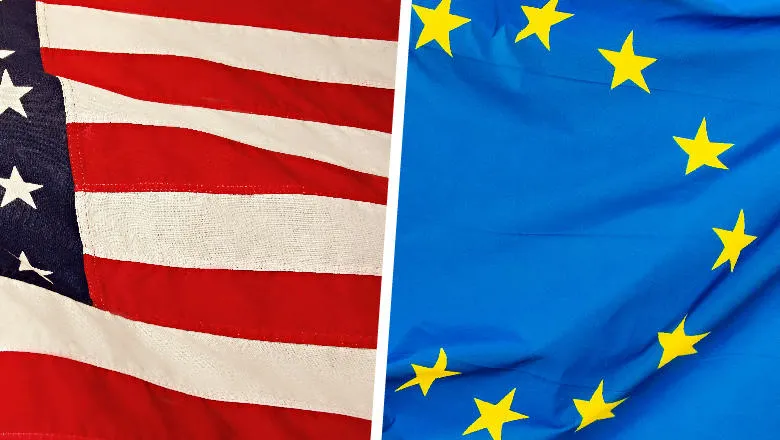23 January 2025
Europe, not America, now favoured as ally for Britain – in reversal from almost 60 years ago, study finds
Britons would now prefer the country be more like Sweden and Switzerland, rather than try to be a leading world power

Read the research
The UK public are now much more likely to say Britain should choose Europe over America if it ever had to decide between the two as allies – a complete reversal of public opinion almost 60 years ago, when the US was seen as the far more important ally, according to new research.
The study, by the Policy Institute at King’s College London, finds a majority of 53% now say Britain should prioritise Europe as an ally over America if needed, compared with 31% who say the opposite – an almost mirror image of opinion back in 1967, when the public favoured America over Europe by 53% to 33%.
The research – which is based on a nationally representative survey by Focaldata of UK adults in December 2024 and data from historic polls – explores how political attitudes have changed over the 20th and 21st centuries, revealing not just a huge shift in perceptions of the UK’s key international partners, but also views on the role the country should play on the world stage.
It finds the public are now almost twice as likely to say they’d prefer the UK to be more like Sweden and Switzerland (51%) instead of trying to be a leading world power (28%) – virtually the opposite to attitudes in 1964, when 51% said the country should attempt to be a world power and 32% said it should follow Sweden and Switzerland’s example.
Among other changes revealed in the study are a big decline in the share of the public who feel MPs should be given a pay rise, as well as increases in the belief that we have democracy in Britain – but also that there is a class struggle in this country and that poverty will never be done away with.
America vs Europe, and Britain’s role on the world stage: political divides
Today Reform UK voters stand out for their commitment to America over Europe, as well as for their reluctance for Britain to try and be a global player:
- By 55% to 31%, Reform voters say Britain should side with America over Europe, if it ever had to choose between them as allies. By contrast, Conservative voters are much more closely divided (America 43% vs Europe 40%), while Labour voters heavily prefer Europe (America 23% vs Europe 65%).
- Conservative and Labour voters are relatively aligned on whether Britain should attempt to be a leading world power (Con: 39%; Lab 34%) or be more like Sweden and Switzerland (Con: 40%; Lab 46%) – but Reform voters are much more likely to say we should follow the Swedish and Swiss approach (61%) instead of trying to be a major power (28%).
MPs’ pay
In 1964, over half (56%) the public said MPs’ salaries should be increased. Now just 13% feel they deserve a pay rise.
In 1964, MPs’ salary was £3,250 a year, equal to around £56,000 in today’s money – far below the £91,346 basic annual salary that MPs earn now.
Although in the 1960s it was widely thought that Parliament benefitted from the fact many MPs earned income from other sources, with it seen as necessary or even desirable that MPs represent business or other interests in their parliamentary work, the report says.
And it is older generations today who are much more opposed than younger people to increasing MPs’ salaries: 87% of those aged 55+ say MPs should not get a pay rise, compared with 63% of 18- to 34-year-olds.
Class struggle
Three-quarters (74%) of the public today think there is a class struggle in the UK – a big increase from around half (48%) who held this view in 1964.
Labour (80%) and Reform UK (82%) voters have similar levels of belief in the idea that there is a class struggle in Britain today, while Conservative voters (58%) are much less likely to feel this is the case.
Democracy in Britain
Seven in 10 (69%) people today say we have democracy in Britain – up from half (50%) in 1946.
Conservative voters (84%) are most likely to feel we have democracy, while Reform voters (58%) are least likely to.
Poverty
In 1964, seven in 10 (70%) people said they didn’t think poverty would ever be done away with in this country. In 2024, this had risen to eight in 10 (80%) people.
The report says that while the original survey question didn’t define poverty, this shift it is probably not surprising given relative poverty increased from around 14% in the 1960s to 22% in 2019.
And while absolute poverty has declined substantially since the 1960s, the big falls happened in the 1980s. Since then, there has been little change in the trend, with around a fifth of the population stuck in absolute poverty since the mid-2000s.
Assisted dying
In 1937, seven in 10 (69%) said “doctors should be given power to end the life of a person incurably ill”, compared with six in 10 (59%) who say the same today.
The report says the issue of assisted dying would have been prominent in people’s minds back in 1937: the year before, the Voluntary Euthanasia (Legislation) Bill was put before Parliament but ultimately defeated in the House of Lords, and the Voluntary Euthanasia Society was founded in England.
The nationalisation of land
Three in 10 (29%) people today say they approve of the nationalisation of land – down from half (51%) in 1964.
However, in this time, the share of the public saying they have no opinion doubled from 19% to 41%, likely reflecting changes in awareness of the issue and its prominence in national debates.
Professor Bobby Duffy, Director of the Policy Institute at King’s College London, said:
“These long-term trends remind us how much we’ve changed, with UK public opinion being shaped by decades of national and global politics. We have moved away from seeing the US as key allies in the 1960s, which won’t just be related to the febrile and unpredictable political atmosphere around the re-election of President Trump, but also to the many years building closer ties to Europe since the 1960s.
“Some of these international uncertainties, as well as perhaps increased realism in our global standing, mean most would now prefer Britain take a lower profile on the world stage, following Sweden or Switzerland’s example, rather than trying to be a leading power.
“These trends are perhaps predictable – but some of the changes seem more surprising at first look, such as the fact that the share of the public who think there is a class struggle in the UK is much higher now than it was in the 1960s. But this is perhaps not as unexpected as it seems: the 70s were the decade when labour movements really flexed their muscle in strike action, and the reality is that economic inequality has grown substantially since then. The meaning of class struggle may have moved on, but the concept is still very relevant to the public.
“And the public have also become more pessimistic about elements of this struggle, particularly the aim of doing away with poverty entirely, which eight in 10 now say will never happen – up from seven in 10 in 1964.
“The research also underscores the new political divides that exist today, with Reform supporters especially standing out. They are notably more likely than voters for the two main parties to see the US as a key ally – very similar to public overall back in the 1960s – and more inclined to want a neutral or isolationist Britain. But Reform voters are also just as likely as Labour voters to believe there’s a class struggle in the UK – highlighting the very particular profile of this political constituency, and a risk for the Labour Party if it struggles to get people to feel tangible, personal economic progress.”
Survey details
Question wordings and response options have been kept consistent between surveys to preserve trends, even though in some cases they do not reflect current best practice in polling methods (for example, not allowing “don’t know” responses).
2024
Fieldwork was conducted via Focaldata’s in-house platform, with API integration to an online panel network. Data collection took place between 11 and 12 December 2024, with a total of 1,033 respondents from a nationally representative group of those aged 18+ in the UK completing the survey. Data was weighted by age, gender, region, ethnicity and education status.
Other years
Data from other years was taken from one of two sources: an NOP survey of c2,000 UK adults in February 1967 and Gallup surveys included in The Gallup International Public Opinion Polls, Great Britain, 1937–1975, with a sample size of c1,000 GB adults.

